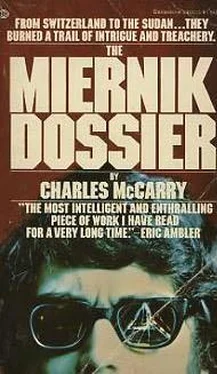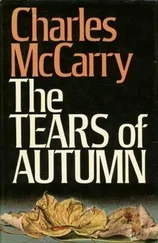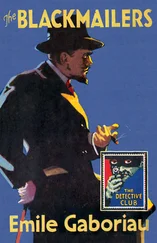“I’m sorry. That’s not good enough, Kirnov. I want facts, not reassurances.”
“Naturally,” Kirnov said. He hitched his chair closer and beckoned Zofia to sit down with us. “First, to all your questions- there are no trip wires where you will be walking, no patrols, no searchlights. The nearest watch-tower is fifty meters from your starting point. That sounds risky, but it is the essential safety factor. Our man will pay a call to this watchtower at exactly 11:10. He will find something wrong with the way the tower is being manned. He is an officer, he does not have to be logical. He will bring the entire crew to attention and berate them for five full minutes-inspect their rifles, criticize the timing of the searchlight, accuse them of every kind of negligence. At this time, the patrol will be on the other side of the watchtower. They will not see you or hear you. There is no moon tonight. On the Austrian side of the border, on a hilltop beyond the woods, there is a house. There will be a light in the window. You walk straight toward the light. This is important, because you are right-there are mines everywhere except where you will walk. As long as you walk with your eyes on the light, never deviating, you will be all right.”
“If I am raking, I’ll be walking backwards.”
“Yes, but Zofia will be walking normally. She will be your guide. Of course you’re right about the raking-we have to hide the footprints so that it will not be known that anyone went across. That’s why it takes two persons, one to guide and one to rake. Otherwise, our rich officer would not have the opportunity of spending his dollars.”
Zofia smiled proudly at Kirnov. “Satisfied?” she asked me. “With Sasha’s good intentions, yes. Do you mind if I ask how well you know this officer you’ve paid?”
“Very well,” Kirnov said. “Oh, very well.”
“You’ve dealt with him before?”
Kirnov turned solemn. “I do not use a girl like Zofia, who is like my own child, as a guinea pig. If I had the slightest doubt that things will go exactly as I have told you, I would not let her leave this cottage. You can believe me when I tell you that.”
Zofia rose and put her arms around the little man. “Yes,” she said, “you can believe that. Now, Sasha, your tea.”
We ate our cold meal in silence by the light of an oil lamp. Zofia kept stealing glances at me. I rewarded her with no smiles, and gradually her air of happiness dissipated. Kirnov produced two large Havana cigars and offered me one. I refused-the idea of smoking a cigar before going over the top was the final touch of incongruity. Kirnov cut his Havana carefully and lit it with a splinter of its wooden wrapping. As he smoked I noticed that he wore a ruby ring on the index finger of his right hand. I realized that his dandyism-the double-breasted blazer, the suede shoes, the precise speech, and now the ring and the Havana-had annoyed me from the start. If headquarters is right in their suppositions about him, he belongs to another era of Russian secret agents. Kirnov belongs in E. Phillips Oppenheim, not in the KGB.
Zofia cleared the plates, giving Kirnov an adoring look as she did so. A guitar hung on the wall, and she took it down and struck the strings. “Sasha taught me to play when I was a little girl,” she said. Smiling at Kirnov, she played a tune I did not recognize. He closed his eyes in pleasure. When she finished, he said, “I always see your mother when I hear that song. A woman of gold.”
“Have you always known each other?” I asked politely. There seemed no point in adding to the bad atmosphere. I was committed to them for the rest of the evening.
“Always,” Kirnov said.
Zofia, with the guitar in her lap, said something in Polish. Kirnov shrugged.
“Sasha was always a friend of my parents,” Zofia said. “He is my godfather and Tadeusz’s too, which is a little strange because he is of course a Jew. My father and mother did not mention this to the priest when we were baptized, and Sasha had no hesitation in promising to raise us as believers in Christ because he saw nothing wrong in revering a fellow Jew.”
“Zofia, no blasphemy. I take my duty seriously. If all those millions of Christians believe Jesus to be God, he is God. All it requires to make a god is belief. Q.E.D.”
“So all through our childhood,” Zofia said, “there was Sasha, with candy and books and stories of his journeys. He always traveled. A long time would go by sometimes. Where is Sasha? We’d look out the window for him. Then, one day, up the walk would come Sasha, buried under a mountain of dolls for me and soldiers for Tadeusz.”
“Books for Tadeusz,” Kirnov said. “For Tadeusz, always books.”
“Then one day when I was very small, Sasha came to live with us. We woke up one morning, and Mother took us into the sitting room to tell us that Sasha was in the house. But we must never tell that he was there. We knew the Germans were in Warsaw. They wanted to kill Sasha because he was a Jew. So Sasha was going to live in our attic and we would keep him alive. From now on, we could never take any children upstairs. There were many rules, all to keep Sasha from being killed. He remained in the attic for four years, and that’s when he taught me to play the guitar.”
“I’ll tell you an amusing story about that,” Kirnov said. “One day in 1943, when I had already been upstairs for more than two years, I was giving Zofia a guitar lesson. It was early evening, just getting dark. You could always tell in those days when it was dusk, even if you had no windows in your room-and of course I had no windows. At dusk the air was filled with the smell of turnips cooking. In a thousand houses, turnips were in the pot-that was all anyone in Poland had to eat. So I smelled the turnips while Zofia tried to learn to play the guitar. I owed her a great deal-she came upstairs every day to see me. And she did other things. It’s indelicate to tell you this, but it will give you an idea of what the times were like. For a man in hiding there is always a problem- he cannot go downstairs to the toilet. One used a newspaper. So each day, Zofia would take a package on her bicycle as she rode to school, and each day put it in a different trash can along her route. For four years, the little packages. This long-haired blond girl on her bicycle with her books.
“Back to the guitar lesson. Zofia is playing. I am correcting her mistakes. We are laughing, I am singing the notes for her to follow. Then-a horrendous banging at the door downstairs. Germans shouting. Where is the Jew? Zofia’s father and I had made a hiding place between the partitions of the wall. No other Jew in Poland could have fitted into this tiny space, but for Sasha Kirnov it was all right. ‘Keep playing. Don’t be afraid of the Germans. Don’t look at the hiding place,’ I told Zofia. I got into the space between the walls. Under my feet was a carpet of rat droppings. A strong smell of rats. I had a pistol, just a small one-not for the Germans but for myself. I held it against my temple, standing between the walls, ready to shoot myself if I was discovered. I heard Zofia playing her guitar. Then the boots of the Germans on the stairs. They burst into the attic and found a little girl playing the guitar, but no Jew. Naturally we hid all traces of my presence during the day-blankets into the trunk, cups and saucers downstairs, and so on. For an hour they searched, pounding on the walls, trying to find a secret hiding place. They failed, as you can see. They had never heard of a man hiding between the walls. After they went away, I came out. I was shaking. I can tell you. Little Zofia took the gun out of my hand. I remember just what she said: ‘Sasha, look at you! You have dirt all over your face, even right on top.’ I always told her that a bald man was lucky because his face never stopped like other people’s-it went right over the top of his head.”
Читать дальше












